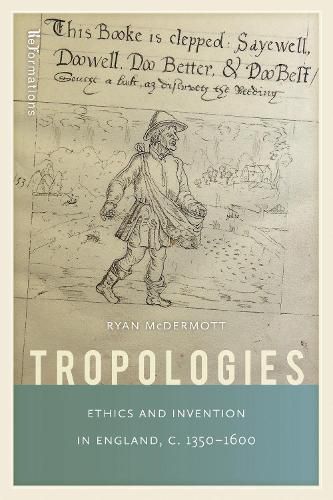Readings Newsletter
Become a Readings Member to make your shopping experience even easier.
Sign in or sign up for free!
You’re not far away from qualifying for FREE standard shipping within Australia
You’ve qualified for FREE standard shipping within Australia
The cart is loading…






This title is printed to order. This book may have been self-published. If so, we cannot guarantee the quality of the content. In the main most books will have gone through the editing process however some may not. We therefore suggest that you be aware of this before ordering this book. If in doubt check either the author or publisher’s details as we are unable to accept any returns unless they are faulty. Please contact us if you have any questions.
Tropologies is the first book-length study to elaborate the medieval and early modern theory of the tropological, or moral, sense of scripture. Ryan McDermott argues that tropology is not only a way to interpret the Bible but also a theory of literary and ethical invention. The tropological imperative demands that words be turned into works-books as well as deeds. Beginning with Augustine, Jerome, and Gregory the Great, then treating monuments of exegesis such as the Glossa ordinaria and Nicholas of Lyra, as well as theorists including Thomas Aquinas, Erasmus, Martin Luther, and others, Tropologies reveals the unwritten history of a major hermeneutical theory and inventive practice. Late medieval and early Reformation writers adapted tropological theory to invent new biblical poetry and drama that would invite readers to participate in salvation history by inventing their own new works. Tropologies reinterprets a wide range of medieval and early modern texts and performances-including the Patience-Poet, Piers Plowman, Chaucer, the York and Coventry cycle plays, and the literary circles of the reformist King Edward VI-to argue that tropological invention provided a robust alternative to rhetorical theories of literary production. In this groundbreaking revision of literary history, the Bible and biblical hermeneutics, commonly understood as sources of tumultuous discord, turn out to provide principles of continuity and mutuality across the Reformation’s temporal and confessional rifts. Each chapter pursues an argument about poetic and dramatic form, linking questions of style and aesthetics to exegetical theory and theology. Because Tropologies attends to the flux of exegetical theory and practice across a watershed period of intellectual history, it is able to register subtle shifts in literary production, fine-tuning our sense of how literature and religion mutually and dynamically informed and reformed each other.
$9.00 standard shipping within Australia
FREE standard shipping within Australia for orders over $100.00
Express & International shipping calculated at checkout
This title is printed to order. This book may have been self-published. If so, we cannot guarantee the quality of the content. In the main most books will have gone through the editing process however some may not. We therefore suggest that you be aware of this before ordering this book. If in doubt check either the author or publisher’s details as we are unable to accept any returns unless they are faulty. Please contact us if you have any questions.
Tropologies is the first book-length study to elaborate the medieval and early modern theory of the tropological, or moral, sense of scripture. Ryan McDermott argues that tropology is not only a way to interpret the Bible but also a theory of literary and ethical invention. The tropological imperative demands that words be turned into works-books as well as deeds. Beginning with Augustine, Jerome, and Gregory the Great, then treating monuments of exegesis such as the Glossa ordinaria and Nicholas of Lyra, as well as theorists including Thomas Aquinas, Erasmus, Martin Luther, and others, Tropologies reveals the unwritten history of a major hermeneutical theory and inventive practice. Late medieval and early Reformation writers adapted tropological theory to invent new biblical poetry and drama that would invite readers to participate in salvation history by inventing their own new works. Tropologies reinterprets a wide range of medieval and early modern texts and performances-including the Patience-Poet, Piers Plowman, Chaucer, the York and Coventry cycle plays, and the literary circles of the reformist King Edward VI-to argue that tropological invention provided a robust alternative to rhetorical theories of literary production. In this groundbreaking revision of literary history, the Bible and biblical hermeneutics, commonly understood as sources of tumultuous discord, turn out to provide principles of continuity and mutuality across the Reformation’s temporal and confessional rifts. Each chapter pursues an argument about poetic and dramatic form, linking questions of style and aesthetics to exegetical theory and theology. Because Tropologies attends to the flux of exegetical theory and practice across a watershed period of intellectual history, it is able to register subtle shifts in literary production, fine-tuning our sense of how literature and religion mutually and dynamically informed and reformed each other.